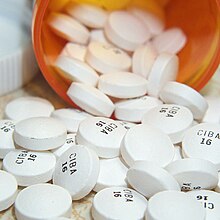
Prescription Drug Marketing Act
 | |
| Long title | An Act to amend the Federal Food, Drug, and Cosmetic Act to ban the reimportation of drugs produced in the United States, to place restrictions on the distribution of drug samples, to ban certain resales of drugs by hospitals and other health care facilities, and for other purposes. |
|---|---|
| Enacted by | the 100th United States Congress |
| Effective | April 22, 1988 |
| Citations | |
| Public law | 100-293 |
| Statutes at Large | 102 Stat. 95 |
| Codification | |
| Acts amended | Federal Food, Drug and Cosmetic Act |
| Titles amended | 21 U.S.C.: Food and Drugs |
| U.S.C. sections amended | 21 U.S.C. ch. 9 §§ 331, 353, 381 |
| Legislative history | |
| |
| Major amendments | |
| Prescription Drug Amendments of 1992 P.L. 102-353, 106 Stat. 941 | |
| Regulation of therapeutic goods in the United States |
|---|
 |
|
Prescription drugs Over-the-counter drugs |
|
Government agencies
|
|
International coordination
|
|
Non-governmental organizations
|
The Prescription Drug Marketing Act (PDMA) of 1987 (P.L. 100-293, 102 Stat. 95) is a law of the United States federal government. It establishes legal safeguards for prescription drug distribution to ensure safe and effective pharmaceuticals and is designed to discourage the sale of counterfeit, adulterated, misbranded, sub potent, and expired prescription drugs. It was passed in response to the development of a wholesale sub-market (known as the "diversion market") for prescription drugs.
The PDMA was modified by the Prescription Drug Amendments of 1992 (P.L. 102-353, 106 Stat. 941) on August 26, 1992.
The U.S. Food and Drug Administration (FDA) issued regulations implementing the PDMA in 1990 (21 C.F.R. Part 205) and 1999 (21 C.F.R. Part 203).
See also
- Food and Drug Administration (FDA, USA)
- Drug distribution
- Inverse benefit law
- Regulation of therapeutic goods